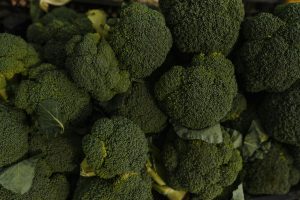
The Science Behind Sulforaphane And Its Impact On Metabolism
Unlocking The Power Of Glucoraphanin And Sulforaphane For Health And Wellness
We all know it is good for us, but how many of us see broccoli as a sports supplement that could unlock improved performance and recovery?
It turns out many athletes already do – and they’re absolutely right to. The science suggests that the humble broccoli can help support longer endurance; faster muscle growth; quicker recovery; reduced body fat; improvements in cardiovascular function; and even protection against damage to joints and organs, helping to prevent injury and protect our long-term health.
So whether you’re an athlete looking for an extra edge, love playing sport, or are just trying to get a bit more exercise to stay healthier, broccoli could help you achieve your goals faster and more easily.
A quick Google search will reveal endless articles and YouTube videos around the theme “Why do bodybuilders eat broccoli?”
It appears the bodybuilder’s plate has long consisted of a generous side of broccoli, with the obligatory portion of lean protein, suggesting this sporting community was early to recognise the amazing benefits of this true superfood for sporting performance and recovery.
In fact, Hollywood superstar Dwayne the Rock Johnson is a big advocates of using broccoli to get ripped for film roles – as is Tom Hardy, who in preparing for his starring role in the film Warrior was “eating chicken and broccoli all day. Nothing else.”
Like many vegetables, broccoli is naturally very low in calories and fat, yet packs a powerful nutritional punch. It’s relatively high in protein for a vegetable, and is also a rich source of fibre and essential vitamins and key minerals, including Vitamin C, Vitamin K, potassium, calcium and selenium – making it a great choice for active athletes eating a healthy diet.
But what sets broccoli apart is an abundance of key bioactive molecules, such as polyphenols and glucoraphanin. In fact, broccoli is the vegetable with the highest concentration of glucoraphanin going – which is no doubt why athletes and bodybuilders have picked it out as their favourite vegetable of all.
When we eat broccoli, the glucoraphanin inside it is converted in our gut into its active form (called sulforaphane). Sulforaphane then enters our cells and exerts several different effects (including boosting our production of antioxidants, reducing inflammation and improving our cells’ ability to function, survive, produce energy and repair damage) which together serve to boost the efficiency and function of our metabolism.
Although it’s great for us, exercise places great demands on our metabolism, both to deliver energy whilst we’re working and afterwards as our body works to recover, rebuild and grow stronger. That’s why athletes have long understood that preparation and recovery are just as important as the actual workout!
Given our metabolism provides us with energy, ensuring it is working well is fundamental to athletic performance, and optimising it unlocks improved muscle power and endurance.
In fact, many top professional athletes now train in specific ‘metabolic zones’ specifically to optimise their metabolism for this reason: for example, ‘Zone 2’ training builds endurance by improving your body’s ability to burn fats for energy, allowing you to work for longer before running out of steam.
It now turns out that broccoli does the same thing, mimicking the training process to give your metabolic fitness an extra boost.
Exercise also introduces a great deal of stress to our body, from damaging muscles to driving internal inflammation. A healthy metabolism supports your body to repair and reverse this damage faster, leading to shorter, less painful recovery periods.
Less time with sore muscles after a workout makes athletes more comfortable and allows them to get back to training sooner, giving you an edge over the competition.
Poor metabolic health can lead to chronic internal inflammation and oxidative stress, which can contribute to joint deterioration (e.g. the development of arthritis) and organ damage.
Actively maintaining your metabolism helps to protect your long-term health from the stresses of pushing yourself to the limit, and reduces the risks of illness and injury to boot!
Due to their restorative effects on our metabolism, glucoraphanin and sulforaphane have been extensively researched for their beneficial effects on human health across a range of different areas — including boosting sports performance and athletic health in four key ways:

Tune up your turbo
for an extra boost
Improves the capacity of your muscles to clear lactate – allowing you to push harder during intense, focused efforts.
Unlock more power for
that extra edge
Improves your muscles’ ability to burn fat for energy – giving you a bigger engine to power long endurance efforts.
Beat soreness & fatigue to get back to your best
Limits lactate build-up & fights inflammation – reducing suffering from delayed-onset muscle soreness (DOMS).

Protect your long-term, whole-body health
Fights inflammation & stimulates anti-oxidant production – reducing oxidative stress damage to organs and joints.
Wang et al, 2020 – Sulforaphane pre-treatment enhanced exercise endurance by 13% and significantly reduced blood lactate levels.
Oh et al, 2017 – Sulforaphane pre-treatment increased running until exhaustion distances by 38%, prevented the build up of lactate in the blood, and helped to protect muscle tissue during intense exercise.
Wang et al, 2022 – Sulforaphane pre-treatment increased running distances by 8%, whilst reducing markers of muscle damage.
Komine et al, 2021 – Sulforaphane pre-treatment significantly reduced post-exercise muscle soreness and suppressed decreases in the range of movement of joints.
Sato et al, 2021 – Sulforaphane pre-treatment reduced markers in the blood of post-exercise muscle damage and inflammation.
So, whether you are into bodybuilding, preparing for a marathon/triathlon or you just want to surprise your squash partner with some newfound vitality, glucoraphanin could be worth a closer look.
That’s why we love broccoli, but there’s one issue with this awesome vegetable: it only actually contains quite a small amount of glucoraphanin. By our calculations, you’d need to be eating several whole broccoli’s a day – and eating them raw! – to really get the most benefit you can from it.
But if cramming endless portions of broccoli into your diet feels overwhelming, have no fear – we’ve got a solution for you. We’ve created a super-broccoli that contains 5x more glucoraphanin than a standard broccoli, and turned it into a simple supplement-style powder – making it incredibly easy to add a powerful dose of super-broccoli into your training plan.
Optimise your performance, endurance and recovery with our raw GRextra powder – made from our super-broccoli to give you an edge.
Add a scoop to your favourite smoothie or shake during training and both before and after race day to train your metabolic fitness, unlock improved performance and endurance, and support recovery.
-> Learn more

Unlocking The Power Of Glucoraphanin And Sulforaphane For Health And Wellness

Ultramarathon Record Holder Nick Butter Explains How Understanding And Supporting Your Metabolism Can Transform Your Wellbeing – Even On The Go

Ultra-processed foods have been linked to more than 30 different health problems, including heart disease, cancer and anxiety. But what actually are ultra-processed foods, and why is everyone suddenly taking about them?

